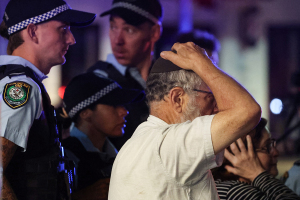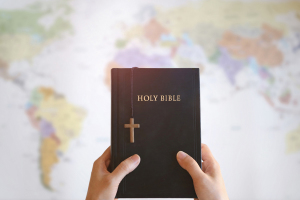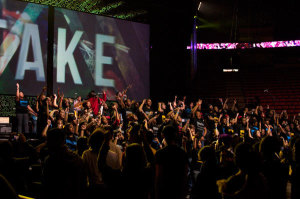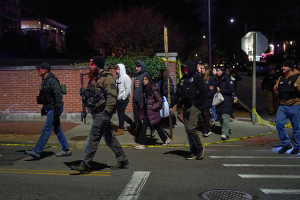Religious Conversion Worst Form of 'Intolerance,' Bhutan PM Says
Propagation of religion is allowable – but not seeking conversions, top politician says
THIMPHU, Bhutan (CDN) - In the Kingdom of Bhutan, where Christianity is still awaiting legal recognition, Christians have the right to proclaim their faith but must not use coercion or claim religious superiority to seek conversions, the country’s prime minister told Compass in an exclusive interview.
“I view conversions very negatively, because conversion is the worst form of intolerance,” Jigmi Yoser Thinley said in his office in the capital of the predominantly Buddhist nation.
Christian leaders in Bhutan have told Compass that they enjoy certain freedoms to practice their faith in private homes, but, because of a prohibition against church buildings and other restrictions, they were not sure if proclamation of their faith – included in international human rights codes – was allowed in Bhutan.
Prime Minister Thinley, who as head of the ruling party is the most influential political chief in the country, said propagation of one’s faith is allowed, but he made it clear that he views attempts to convert others with extreme suspicion.
“The first premise [of seeking conversion] is that you believe that your religion is the right religion, and the religion of the convertee is wrong – what he believes in is wrong, what he practices is wrong, that your religion is superior and that you have this responsibility to promote your way of life, your way of thinking, your way of worship,” Thinley said. “It’s the worst form of intolerance. And it divides families and societies.”
Bhutan’s constitution does not restrict the right to convert or proselytize, but some Non-Governmental Organizations have said the government effectively limits this right by restricting construction of non-Buddhist worship buildings and celebration of some non-Buddhist festivals, according to the U.S. Department of State’s 2010 International Religious Freedom Report.
It adds that Bhutan’s National Security Act (NSA) further limits proclamation of one’s faith by prohibiting “words either spoken or written, or by other means whatsoever, that promote or attempt to promote, on grounds of religion, race, language, caste, or community, or on any other ground whatsoever, feelings of enmity or hatred between different religious, racial, or language groups or castes and communities.” Violation of the NSA is punishable by up to three years’ imprisonment, though whether any cases have been prosecuted is unknown, according to the State Department report.
Bhutan’s first democratic prime minister after about a century of absolute monarchy, Thinley completed three years in office last Thursday (April 7). While he affirmed that it is allowable for Christians to proclaim their faith – a practice commanded by Christ, with followers agreeing that it is the Holy Spirit, not man, that “converts” people – Thinley made his suspicions about Christians’ motives manifest.
“Any kind of proselytization that involves economic and material incentives [is wrong],” he said. “Many people are being converted on hospital beds in their weakest and most vulnerable moments. And these people are whispering in their ears that ‘there is no hope for you. The only way that you can survive is if you accept this particular religion.’ That is wrong.”
Thinley’s suspicions include the belief that Christians offer material incentives to convert.
“Going to the poor and saying, ‘Look, your religion doesn’t provide for this life, our religion provides for this life as well as the future,’ is wrong. And that is the basis for proselytization.”
Christian pastors in Thimphu told Compass that the perception that Bhutan’s Christians use money to convert the poor was flawed.
The pastors, requesting anonymity, said they prayed for healing of the sick because they felt they were not allowed to preach tenets of Christianity directly. Many of those who experience healing – almost all who are prayed for, they claimed – do read the Bible and then believe in Jesus’ teachings.
Asked if a person can convert if she or he believed in Christianity, the prime minister replied, “[There is] freedom of choice, yes.”
In his interview with Compass, Thinley felt compelled to defend Buddhism against assertions that citizens worship idols.
“To say that, ‘Your religion is wrong, worshiping idols is wrong,’ who worships idols?” he said. “We don’t worship idols. Those are just representations and manifestations that help you to focus.”
Leader of the royalist Druk Phuensum Tshogpa party, Thinley is regarded as a sincere politician who is trusted by Bhutan’s small Christian minority. He became the prime minister in April 2008 following the first democratic election after Bhutan’s fourth king, Jigme Singye Wangchuck, abdicated power in 2006 to pave the way toward democracy.
Until Bhutan became a constitutional monarchy in 2008, the practice of Christianity was believed to be banned in the country. The constitution now grants the right to freedom of thought, conscience and religion to all citizens. It also states that the king is the protector of all religions.
Thus far, the Religious Organisations Act of 2007 has recognized only Buddhist and Hindu organizations. As a result, no church building or Christian bookstore has been allowed in the country, nor can Christians engage in social work. Christianity in Bhutan remains confined to the homes of local believers, where they meet for collective worship on Sundays.
Asked if a Christian federation should be registered by the government to allow Christians to function with legal recognition, Thinley said, “Yes, definitely.”
The country’s agency regulating religious organizations under the 2007 act, locally known as the Chhoedey Lhentshog, is expected to make a decision on whether it could register a Christian federation representing all Christians. The authority is looking into provisions in the law to see if there is a scope for a non-Buddhist and non-Hindu organization to be registered. (See www.compassdirect.com, “Official Recognition Eludes Christian Groups in Bhutan,” Feb. 1.)
On whether the Religious Organisations Act could be amended if it is determined that it does not allow legal recognition of a Christian federation, the prime minister said, “If the majority view and support prevails in the country, the law will change.”
Thinley added that he was partially raised as a Christian.
“I am part Christian, too,” he said. “I read the Bible, occasionally of course. I come from a traditional [Christian] school and attended church every day except for Saturdays for nine years.”
A tiny nation in the Himalayas between India and China, Bhutan has a population of 708,484 people, of which roughly 75 percent are Buddhist, according to Operation World. Christians are estimated to be between 6,000 to nearly 15,000 (the latter figure would put Christians at more than 2 percent of the population), mostly from the south. Hindus, mainly ethnic Nepalese, constitute around 22 percent of the population and have a majority in the south.
Religious ‘Competition’
Bhutan’s opposition leader, Lyonpo Tshering Togbay, was equally disapproving of religious conversion.
“I am for propagation of spiritual values or anything that allows people to be good human beings,” he told Compass. “[But] we cannot have competition among religions in Bhutan.”
He said, however, that Christians must be given rights equal to those of Hindus and Buddhists.
“Our constitution guarantees the right to freedom of practice – full stop, no conditions,” he said. “But now, as a small nation state, there are some realities. Christianity is a lot more evangelistic than Hinduism or Buddhism.”
Togbay said there are Christians who are tolerant and compassionate of other peoples, cultures and religions, but “there are Christians also who go through life on war footing to save every soul. That’s their calling, and it’s good for them, except that in Bhutan we do not have the numbers to accommodate such zeal.”
Being a small nation between India and China, Bhutan’s perceived geopolitical vulnerability leads authorities to seek to pre-empt any religious, social or political unrest. With no economic or military might, Bhutan seeks to assert and celebrate its sovereignty through its distinctive culture, which is based on Buddhism, authorities say.
Togbay voiced his concern on perceived threats to Bhutan’s Buddhist culture.
“I studied in a Christian school, and I have lived in the West, and I have been approached by the Jehovah’s Witness – in a subway, in an elevator, in a restaurant in the U.S. and Switzerland. I am not saying they are bad. But I would be a fool if I was not concerned about that in Bhutan,” he said. “There are other things I am personally concerned about. Religions in Bhutan must live in harmony. Too often I have come across people who seek a convert, pointing to statues of our deities and saying that idol worship is evil worship. That is not good for the security of our country, the harmony of our country and the pursuit of happiness.”
The premise of the Chhoedey Lhentshog, the agency regulating religious organizations, he said, “is that all the different schools of Buddhism and all the different religions see eye to eye with mutual respect and mutual understanding. If that objective is not met, it does not make sense to be part of that.”
It remains unclear what the legal rights of Christians are, as there is no interaction between the Christians and the government. Christian sources in Bhutan said they were open to dialogue with the government in order to remove “misunderstandings” and “distrust.”
“Thankfully, our political leadership is sincere and trustworthy,” said one Christian leader.
Asserting that Christians enjoy the right to worship in Bhutan, Prime Minister Thinley said authorities have not interfered with any worship services.
“There are more Christian activities taking place on a daily basis than Hindu and Buddhist activities,” he added.



























